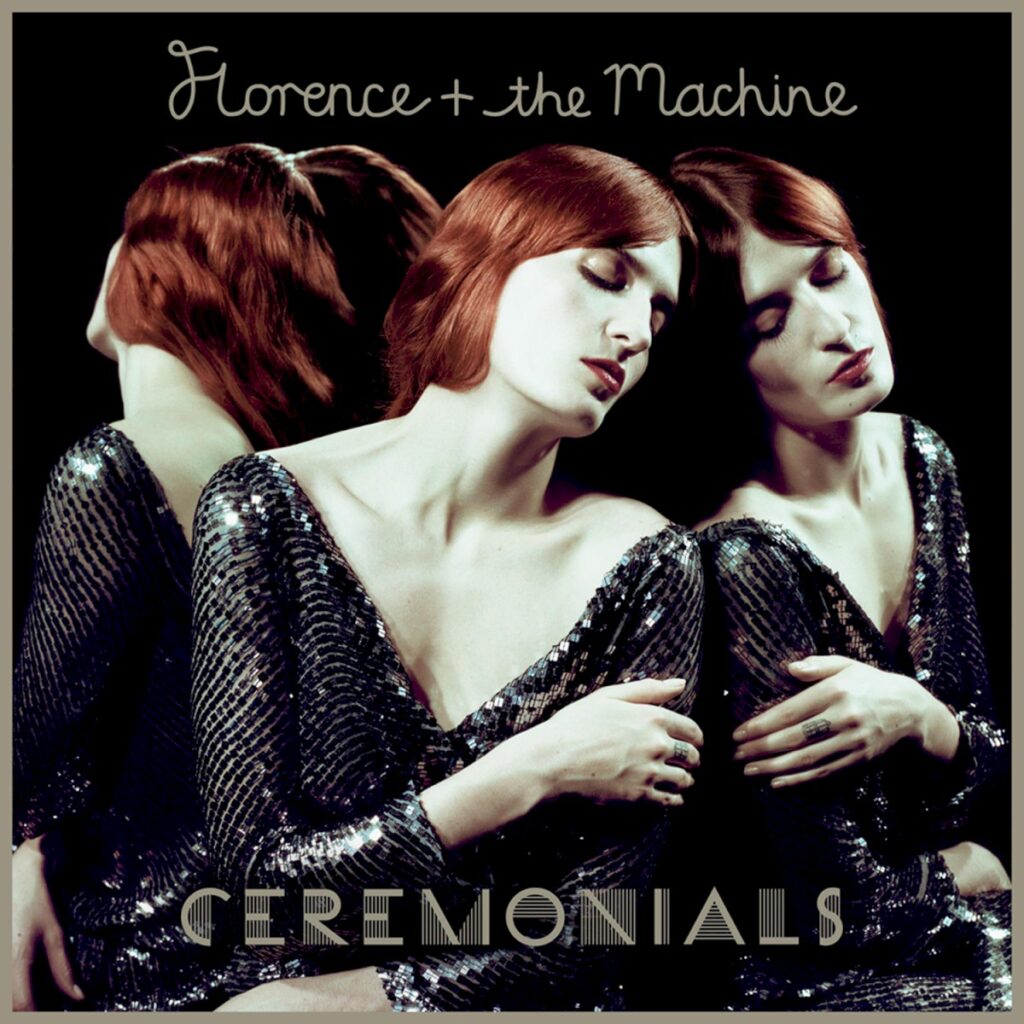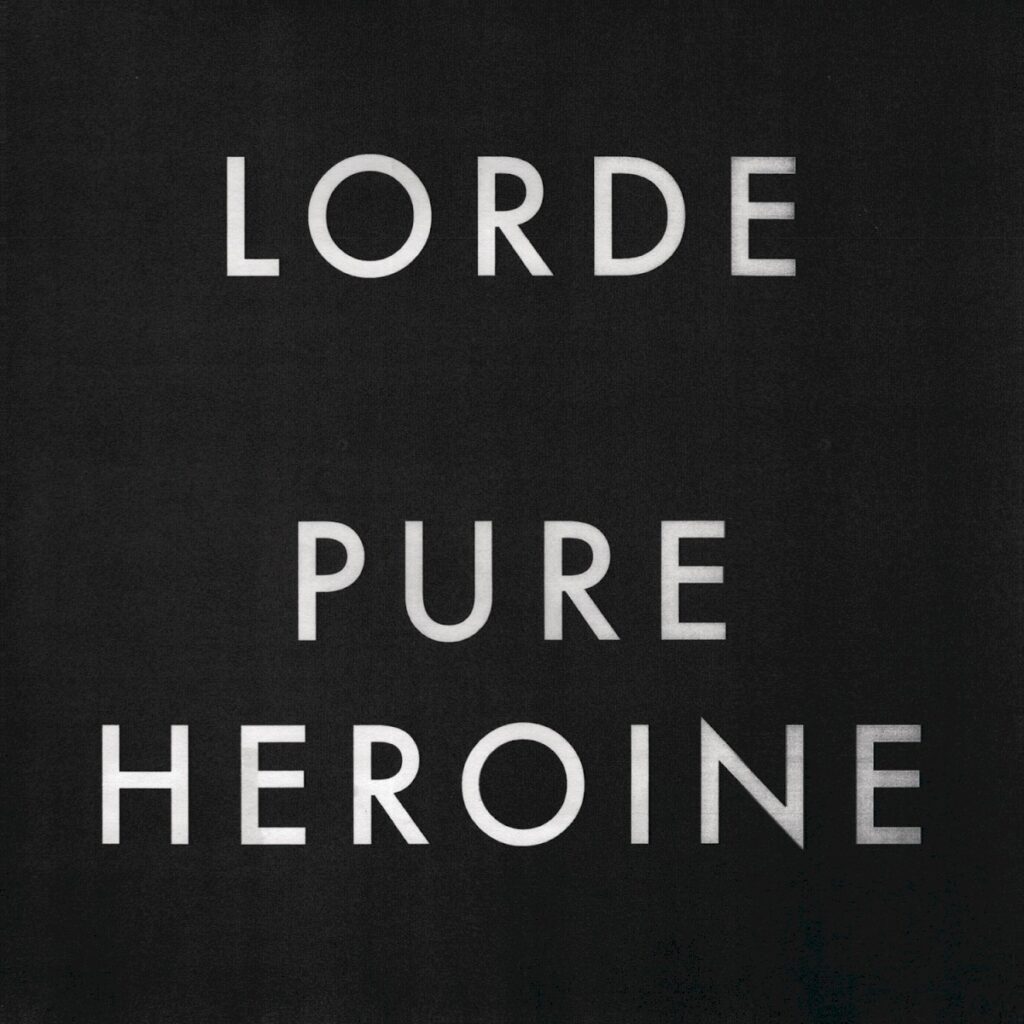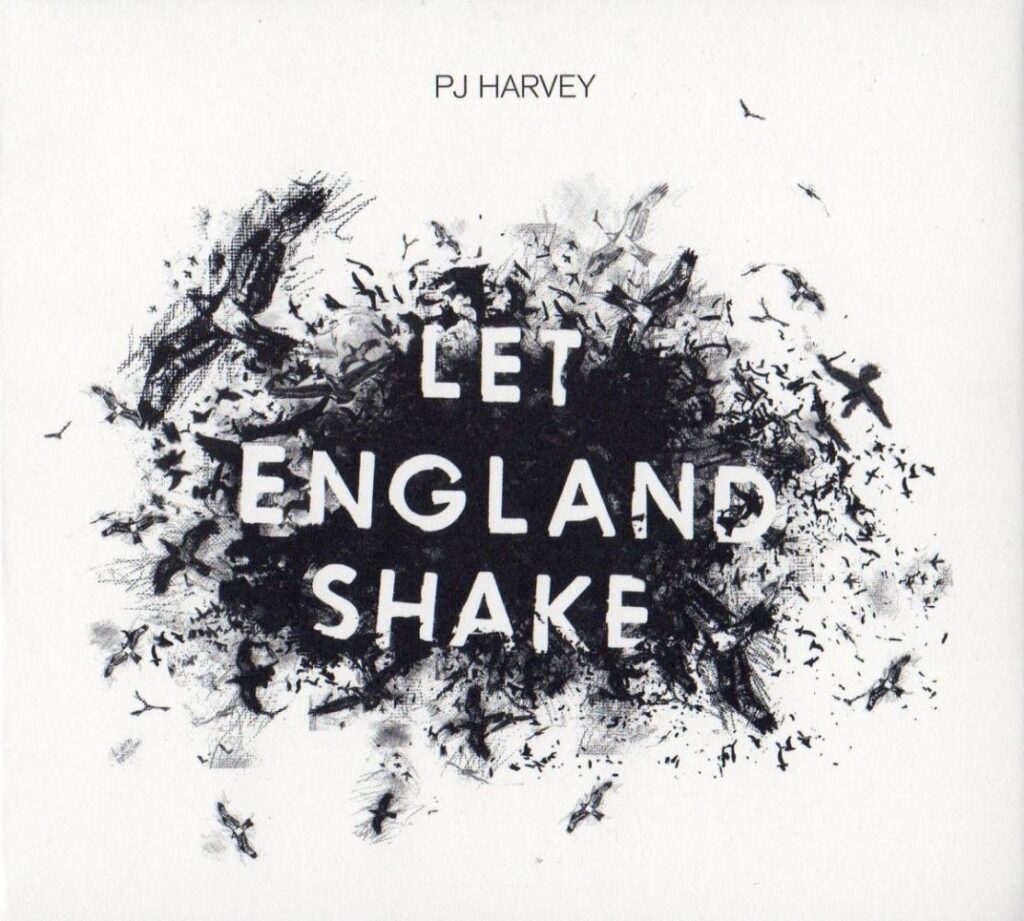55.
Florence + The Machine, ‘Ceremonials,’ 2011

Florence + The Machine’s sophomore effort, Ceremonials, is characterized by grandiosity and introspection. The album’s theme is ethereal and spiritually evocative, straddling between the earthly and the otherworldly, diving deep into themes of life, death, love, and personal demons. Despite its spiritual overtones, Ceremonials does not adhere to traditional religious or ceremonial content. Instead, Florence Welch’s lyrical content explores modern depictions of struggle and redemption. Tracks like Shake It Out encapsulate this conflict, with lyrics that outline a struggle against personal demons: “It’s hard to dance with a devil on your back / So shake him off.” This profound exploration of personal turmoil is repeated in songs like What the Water Gave Me, which describes a drowning suicide in almost appreciative terms. Ceremonials oscillates between poetic brilliance and lyrical overreach. While Welch’s lyrics can be deeply moving and artistically rich, they sometimes veer into excessively dramatic territory. Tracks such as Only If For a Night and What the Water Gave Me introduce listeners to a gothic realm brimming with imagery of ghosts, water, and death, often combined with literal and metaphorical drowning. In contrast to the high drama and overarching themes of many tracks, songs like Breaking Down delve deeper into more intimate emotional experiences. Here, Welch uses tape slap reverb and whispered vocals to cast a vulnerable spell, reminiscent of the emotive style of Arcade Fire. Sonically, Ceremonials stands out for its lush orchestral arrangements and rich choral harmonies, towering soundscapes. Richly layered instrumental compositions feature prominently throughout the album, with amalgamations of booming Celtic-style drums, harps, violins, and organs supporting Welch’s powerful vocals, creating a surging, oceanic floodtide of sound. Tracks like No Light, No Light and What the Water Gave Me are particularly notable for their grand arrangements and choir-like choruses, which lend a hymn-like quality to the album. Such tracks also showcase Producer Paul Epworth’s masterful ability to craft an ethereal soundscape that balances Welch’s powerful vocals with an atmospheric instrumental backdrop. This interplay is evident in the bone-chilling organ that prefaces the choral ascension in What the Water Gave Me, offering the track an almost sacred quality.
54.
Vince Staples, ‘Summertime ’06,’ 2015

Vince Staples’ debut album, Summertime ’06, is a concept album centering around the summer of 2006, a pivotal time in his life when he experienced a profound loss of innocence. The album vividly recounts Staples’ coming-of-age amidst the chaotic backdrop of Long Beach’s gang culture. Unlike other hip-hop albums that explore youth and urban struggles with a hint of redemption, Summertime ’06 retains a somber, unflinching tone throughout. This thematic foundation is unmistakably evident from the album cover, inspired by Joy Division’s Unknown Pleasures, cleverly altered to resemble ocean waves symbolizing the fluctuating and sometimes overwhelming nature of Staples’ experiences. Moreover, Staples encapsulates the alienated youth’s quest for identity and stability amidst societal neglect and systemic violence. The narrative structure of Summertime ’06 is an assemblage of stark vignettes rather than a single linear storyline. Staples’ lyrics are characterized by their stark realism and vivid imagery, providing listeners with an unvarnished look at his environment. The album’s opener, Ramona Park Legend Pt. 1, quickly immerses the audience in Staples’ world with environmental sounds like seagulls and gunshots, setting a foreboding tone. Tracks like Lift Me Up delve deeply into themes of racial identity and social mobility. Staples questions the sincerity of his audience’s support, highlighting the ironic distance between his lived experiences and their perceptions. In Surf, Staples critiques systemic issues by bringing attention to the exploitation and neglect faced by his community, emphasizing the indifference shown towards young black lives. On C.N.B., Staples articulates his frustrations with institutionalized racism, drawing parallels between historical injustices and present-day challenges. Summertime ’06 is also notable for its sparse, almost minimalist production, which is exemplified in tracks like Señorita, which features little more than a repetitive piano riff and programmed drums. The beats are often cold and mechanical, occasionally evoking a sense of claustrophobia and isolation. Such an approach creates a sonic landscape that is consistently dark and murky, matching the grim narrative. Staples’ unique voice—calmly detached, yet fiercely focused—complements this harsh sonic backdrop. On Birds & Bees, the interplay between Staples’ conversational, methodical delivery and the beat’s hypnotic loop highlights the album’s meticulous arrangement.
53.
Billie Eilish, ‘WHEN WE ALL FALL ASLEEP, WHERE DO WE GO?’, 2019

Bite my tongue, bide my time
Wearing a warning sign
Wait ’til the world is mine
Visions I vandalize
Cold in my kingdom size
Fell for these ocean eyes
The title of Billie Eilish’s debut studio album, WHEN WE ALL FALL ASLEEP, WHERE DO WE GO?, poses an existential question, one that Eilish navigates through her music. At its core, WHEN WE ALL… is an exploration of the blurred lines between reality and the subconscious. The album fundamentally revolves around the concept of dreams, nightmares, personal insecurities, and the psychological intrigues that accompany sleep. Eilish herself has spoken candidly about her experience with night terrors, lucid dreams, and sleep paralysis, elements that are deftly woven into the fabric of the album’s thematic structure. The thematic depth of the record extends beyond mere nocturnal wanderings. Eilish tackles subjects like modern youth, mental health, drug addiction, and heartbreak with a mix of horror and humor, resulting in a haunting and refreshingly honest portrayal of contemporary adolescence. The album’s lyrics convey a blend of horror and humor, encapsulated in straightforward yet evocative language. Throughout the album, Eilish confronts her inner demons and external challenges with astonishing candor. In wish you were gay, she addresses her insecurities surrounding unrequited love and the complexities of human relationships. Songs like when the party’s over showcase a more melancholic side, reflecting on the end of a relationship with a poignant sense of loss. Throughout the album, Eilish showcases insightful and mature lyrical expression beyond her age. Musically, WHEN WE ALL… defies categorization, fusing elements of pop, electropop, avant-pop, and art pop, while also drawing on influences from hip-hop and industrial music. Despite being crafted in a modest bedroom studio, the album’s sound is polished and intricate. Finneas’s production emphasizes Billie’s vocals, often utilizing whisper-quiet recordings to juxtapose against more dynamic instrumental backdrops. This minimalist approach to music production mirrors the intimate and reflective qualities of the album’s themes. A hallmark of the album’s composition is its employment of unconventional rhythms and beats. For instance, you should see me in a crown includes sharp, staccato elements that heighten the track’s intensity, while when the party’s over contrasts minimalist piano with emotional, airy vocals. Each song stands out as a unique facet of the overall concept, yet together they form a coherent auditory experience.
52.
Lorde, ‘Pure Heroine,’ 2013

But every song’s like
Gold teeth, Grey Goose, trippin’ in the bathroom
Bloodstains, ball gowns, trashin’ the hotel room
We don’t care, we’re driving Cadillacs in our dreams
But everybody’s like
Cristal, Maybach, diamonds on your timepiece
Jet planes, islands, tigers on a gold leash
We don’t care, we aren’t caught up in your love affair
At just 16 years old, New Zealand’s Lorde released her debut album Pure Heroine. The cornerstone of the album is its exploration of social class, teenage angst, and the hollow nature of fame. Lorde’s moderate upbringing in a low/middle-class family significantly influenced the album’s thematic concerns. This background allowed her to recognize and vocalize the blatant disparities between social classes, particularly focusing on the societal elite, and Lorde portrays these themes through her unique, precocious cynicism and take-no-prisoners attitude. Lorde’s disdain for traditional pop tropes and her desire to bring meaning into her lyrics are evident throughout the album. Tracks like Royals and Team express a clear rejection of extravagant wealth and hard partying, preferring authenticity and simplicity. The album’s title itself, Pure Heroine, is a clever play on words, alluding both to a righteous female hero and the sordid downfall associated with “pure heroin.” Lorde’s lyrics are a rich tapestry of social commentary, personal reflection, and poetic wordplay. From the opening line of Tennis Court—”Don’t you think that it’s boring how people talk?”—to the concluding “Let ’em talk” in A World Alone, there is a cohesiveness to her narrative that critiques societal norms. Her lyrics often contain vivid imagery and metaphors, like in White Teeth Teens, where she likens perfect suburban teens to the upper class with lines like “I am not a white teeth teen—I tried to join but never did.” In Royals, as Lorde lists items that epitomize young Hollywood—”gold teeth, Grey Goose, Cristal, Maybach”—she dismisses them with a shrug, resisting the lifestyle often sought by aspiring pop stars. On a softer side, Ribs takes a more introspective approach, exploring the anxieties associated with aging and the uncertainties of growing up. Pure Heroine is characterized by its minimalist production, deep bass, and programmed beats, a stark contrast to the lush orchestrations typical of its time. The album’s minimalism is not just in its instrumentation but also in its structure. Each track is a semi-fantasy setting, whether it’s the flawed but worthy paradise in 400 Lux or the dystopian saga of Team and Glory and Gore. The sparse production allows Lorde’s voice, its smoky, restrained quality yet powerful delivery to be the focal point.
And I’ll never go home again
Place the call, feel it start, favorite friend
And nothing’s wrong, when nothing’s true
I live in a hologram with you
We’re all the things that we do for fun
And I’ll breathe, and it goes, play along
Make-believe it’s hyper real
But I live in a hologram with you
51.
PJ Harvey, ‘Let England Shake,’ 2011

PJ Harvey’s eighth studio album, Let England Shake, stands as a stark and poignant commentary on the human cost of war and the shifting identity of Harvey’s homeland, England. Inspired by extensive research into historical conflicts, primarily World War I, the album presents a narrative-rich tapestry that intertwines the horrors of warfare with the broader socio-political landscape of England. Harvey’s meticulous attention to lyrical detail foregrounds the emotional and physical toll of war, painting a vivid, sometimes unsettling picture of its impact. The record opens with the titular track, where Harvey declares, “The West’s asleep, let England shake,” setting the tone for the introspective and critical exploration that follows. This line encapsulates a sense of complacency and decay, urging introspection on England’s past and present. Harvey’s lyrical prowess shines through with a blend of poetic imagery and historical references. Tracks like The Words That Maketh Murder delivers a chilling commentary on the brutalization of soldiers, encapsulated in the grim line, “Soldiers fall like lumps of meat.” Such visceral imagery is recurrent, with songs like All and Everyone and Hanging in the Wire reflecting the harrowing conditions of battlefields. Moreover, the album addresses the ambiguity of national pride and identity. The Last Living Rose articulates a longing for England as a place marred by “gray, damp filthiness of ages,” while England provides a more somber introspection: “England, you leave a taste / a bitter one.” This dichotomy reflects Harvey’s complex relationship with her homeland, oscillating between affection and disillusionment. Musically, Let England Shake represents Harvey’s most complex and inventive work to date. Recorded in a 19th-century church in Dorset, the album benefits from the natural acoustics of the space, which imbue the tracks with a haunting reverberation. The instrumentation is diverse, primarily utilizing the autoharp alongside guitar, organ, and electronic filters, fostering an eerie, otherworldly atmosphere. The compositions deftly combine traditional British folk elements with avant-garde production. For instance, In the Dark Places melds mournful melodies with electronic textures, while On Battleship Hill channels a chilling sense of poignancy reminiscent of Kate Bush’s haunting vocal style. In short, the thematic depth, reflective commentary, and compositional brilliance make Let England Shake a richly inventive album that’s unlike anything else in Harvey’s back catalog.
Death lingering, stunk
Flies swarming everyone
Over the whole summit pea,
Flesh quivering in the heat
This was something else again
I fear it cannot explain
The words that make, the words that make
Murder